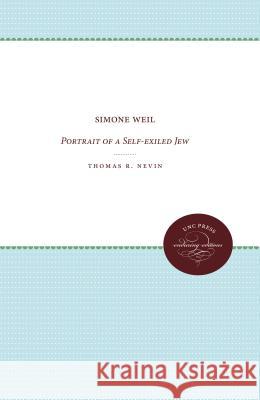Simone Weil: Portrait of a Self-exiled Jew » książka
Simone Weil: Portrait of a Self-exiled Jew
ISBN-13: 9780807865743 / Angielski / Miękka / 2012 / 504 str.
Over fifty years after her death, Simone Weil (1909-1943) remains one of the most searching religious inquirers and political thinkers of the twentieth century. Albert Camus said she had a "madness for truth." She rejected her Jewishness and developed a strong interest in Catholicism, although she never joined the Catholic church. Both an activist and a scholar, she constantly spoke out against injustice and aligned herself with workers, with the colonial poor in France, and with the opressed everywhere. She came to believe that suffering itself could be a way to unity with God, and her death at thirty-four has been recorded as suicide by starvation.
This extraordinary study is primarily a topography of Weil's mind, but Thomas Nevin is persuaded that her thought is inextricably bound to her life and dramatic times. Thus, he not only addresses her thoughts and her prejudices but examines her reasons for entertaining them and gives them a historical focus. He claims that to Weil's generation the Spanish War, the Popular Front, the ascendance of Hitlerism, and the Vichy years were not mere backdrops but definitive events.
Nevin explores in detail not only matters of continuing interest, such as Weil's leftist politics and her attempt to embrace Christianity, but also hitherto unexamined aspects of her life and work which permit a deeper understanding of her: her writings on science, her work as a poet and dramatist, and her selective friendships. The thread uniting these topics is her struggle to maintain her independence as a free thinker while resisting community such as Judaism could have offered her. Her intellectual struggles eloquently reveal the desperate isolation of Jews torn between the lure of assimilation and the tormented dignity of their communal history.
Nevin's massive research draws on the full range of essays, notebooks, and fragments from the Simone Weil archives in Paris, many of which have never been translated or published.
Originally published in 1991.
A UNC Press Enduring Edition -- UNC Press Enduring Editions use the latest in digital technology to make available again books from our distinguished backlist that were previously out of print. These editions are published unaltered from the original, and are presented in affordable paperback formats, bringing readers both historical and cultural value.











